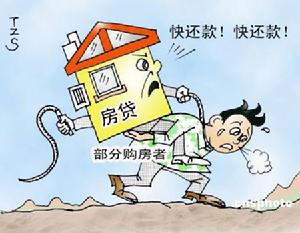“Mortgage slave”的版本间的差异
来自China Digital Space
| 第1行: | 第1行: | ||
房奴 (fáng nú): mortgage slave | 房奴 (fáng nú): mortgage slave | ||
| − | A mortgage slave is someone who | + | A mortgage slave is someone who spends more than 40% of his or her disposable income on a home mortgage. People may become mortgage slaves by purchasing a house with a very low down payment and spending twenty to thirty of their golden years working extremely hard to afford very high monthly mortgage payments. |
The word “mortgage slave” was [http://baike.baidu.com/view/41339.htm included in a list of new Chinese words] by the Ministry of Education in 2007, demonstrating the extent to which high property prices have become a source of pressure and anxiety for China's lower- and middle-class citizens. | The word “mortgage slave” was [http://baike.baidu.com/view/41339.htm included in a list of new Chinese words] by the Ministry of Education in 2007, demonstrating the extent to which high property prices have become a source of pressure and anxiety for China's lower- and middle-class citizens. | ||
2013年4月29日 (一) 17:35的版本
房奴 (fáng nú): mortgage slave
A mortgage slave is someone who spends more than 40% of his or her disposable income on a home mortgage. People may become mortgage slaves by purchasing a house with a very low down payment and spending twenty to thirty of their golden years working extremely hard to afford very high monthly mortgage payments.
The word “mortgage slave” was included in a list of new Chinese words by the Ministry of Education in 2007, demonstrating the extent to which high property prices have become a source of pressure and anxiety for China's lower- and middle-class citizens.
In addition to “mortgage slaves,” there are also “card slaves”, “car slaves”, and “certificate slaves”. These newly coined words reflect an increasing dependence on credit and loans in the pursuit of property, a lifestyle, and education.





